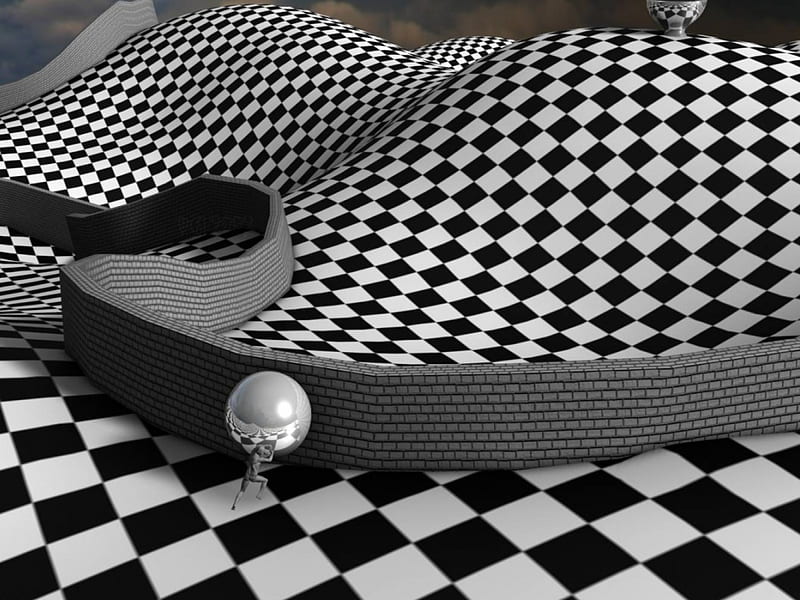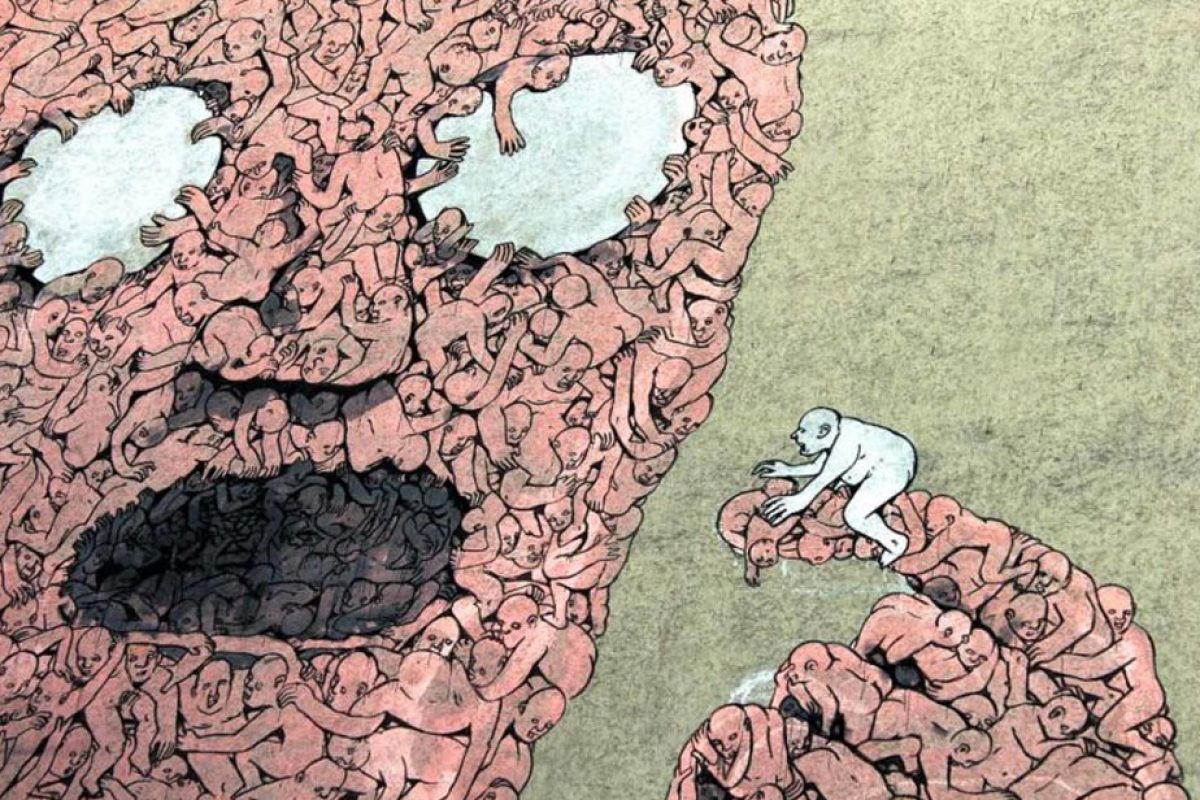The triumph of the replicator is simply to replicate. This is its ultimate achievement, the only achievement it is capable of recognizing. The beauty of this scheme – if we may call it that – is the way in which everything becomes so very defined, so very straightforward – there’s no two ways about what needs to be done, just as there’s no doubt and no lack of clarity about how supremely important it is to actually get on and do it. Lack of clarity just isn’t an issue here…
Once we’re playing the replication game then life really is mapped out for us – it is mapped out in a way that is totally and completely non-ambiguous and this marvellous ‘lack of ambiguity’ is the perfect solution to the existential angst that we would otherwise be plagued with. We have in this way neatly side-stepped the demand that life places upon us – we have simply adapted ourselves to a convenient structure. We have swapped freedom for negative freedom, which is the ‘freedom not to be free‘. When we’re playing the replication game both ‘who we are’ and ‘what we have to do’ is 100% defined. The task at hand (which is the faithful replication of the defined self) is thus absolutely straightforward. It couldn’t be more straightforward. There’s no mystery or confusion about this task; there’s absolutely no question about it – the only ‘question’ that matters is the question of how we are going to successfully carry it out.
Conditioned existence – which is for the most part the only existence we know – is all about viral self-replication. There’s nothing else in it! Conditioned existence is in essence all about ‘fulfilling the prescribed task’; it’s all about how good we are at doing the job that we have been given to do and nothing at all to do with how good we are at questioning the need for the job, or reflecting upon the actual point or meaningfulness of the job. Conditioned existence doesn’t lend itself to any philosophizing – philosophers get laughed out of town in the realm of conditioned existence. Philosophy is totally lame as far as finite game players are concerned. The task we’re engaged in is not to be questioned – questioning is not the point at all…
On the one hand conditioned (or ‘societal’) life might be said to be all about slipping into a defined (or prescribed) identity and then, once we have been given this identity, perpetuating and promoting it as best we can. That’s one way of talking about the ‘task at hand’. Another way of talking about the ‘task’ or ‘job’ would be to say that it consists of faithfully transmitting a whole bunch of ideas or memes. We receive the memes and then we have to ‘run with them’ as best we can. We are then obliged to promote them, to replicate them, to do our very best to ensure their perpetuity. This second point may not be quite as clear as the first – we all understand the psychological drive to promote and perpetuate the defined self, the defined identity, but the suggestion that another aspect of this ‘task’ is the requirement to replicate a whole bunch of memes may not seem on the face of it to make as much sense.
There is no discrepancy between the two approaches however – the defined self or identity is ‘the set of transmitted ideas or memes’. The self is an idea (or a collection of ideas), and in the same way all ideas are selves. All ideas are ‘selves’ because they actively want to survive, because they actively don’t want to die. An idea only ‘wants’ one thing and that is to replicate itself. The game is as simple as this – there really is nothing else to it. As we started off this discussion by saying, the triumph of the replicator is to replicate. If I am a replicator, then all I need to do in order to feel good is to successfully replicate myself and – contrariwise – all I need to do in order to feel bad is to fail at this task. This is how it works. ‘Survive’ is the only rule of the game…
We can put this in what is possibly a more familiar way by saying that the basic motivation of the conditioned or defined self to ‘actualize its goals’, to make its plans come to pass. When I achieve my goal I feel good and when I fail at this task I feel correspondingly bad. This is the essential game of the conditioned self – no matter what else it may appear to be doing it is only ever really doing this. What else is a goal other than an idea? And what else is actualizing or realizing a goal other than replicating it, perpetuating it, extending it into the future? We labour under the illusion that there is something creative about realizing our goals, that we are bringing something new into the world. We call it ‘progress’! But we are not bringing something new into the world – we’re bringing something old into the world. Or rather, we aren’t bringing something old into the world because it was there already – we are perpetuating something, repeating something, copying or replicating something that was already there. We are extending something fixed (or ‘final’) into the indefinite future. The realization of a goal is ‘the triumph of the past over the future’, to use James Carse’s terms.
So when I successfully repeat the past then I feel good and when I fail to repeat it then I feel bad. This – in a nutshell – is what the ‘replication game’ is all about. But as soon as we express the situation like this we can see that it doesn’t sound very healthy. It actually sounds downright perverse! We’re repeating the old at the expense of the new; we’re reiterating what already has happened at the expense of what might happen. We’re repeating the past rather than take the risk of something happening that we don’t already know about! We’d rather live in an unreal bubble of recycled time rather than move forward, and let go of ‘what has been’. We’d rather just stick with the ‘old’ forever. This is perverse precisely because we’re saying that what is happening isn’t happening. The truth of the matter – which we can hardly deny – is that life is a movement from the old to the new; it is a ‘becoming’, as Henri Bergson says. This is the most fundamental truth there is – the truth of change, the truth of impermanence. We don’t need any high-powered research to show that this is how things are – we just need to open our eyes (so to speak) and observe ourselves and the world without the thinking, measuring mind getting in the way. What we unfailingly notice when we do this is that there is a movement going on. Things are just ‘staying the same’ – it’s only our rational mind that is staying the same.
The difficulty here then is that we almost always see the world through the lens of the rational mind and the thing about this is that the rational mind is based on fixed rules. The rational mind is based upon the premise that there is such a thing as a fixed or static frame of reference and that this static FOR is the only reality. But just because the only way that the thinking mind can operate is by assuming a static framework doesn’t mean that there actually is such a thing! The static FW is only there (only seems to be there) because we assume that it is, because we tacitly agree that it is – without paying attention to the fact that we have tacit assumed anything. It’s only there because we have the groundless belief that it’s there, the unexamined conviction that it’s there. It’s a game that we are playing, in other words – a game that makes us see everything backwards.
This backwards way of seeing everything means that we see resisting change (and building upon the established pattern, the established order) as the right and proper thing to do so that when we successfully maintain the established pattern we feel like heroes. We feel euphoric, as if we have achieved something truly great. We feel validated, we feel vindicated, we feel totally pleased with ourselves, and so on. When we talk about the sweet, sweet taste of success this is what we are talking about. And when we talk about having the bitter taste of failure left in our mouths, the failure in question is the failure to faithfully ‘repeat the past’! The nature of the game being played is, as we have said, very, very simple – to successfully repeat the past is the ultimate good and to fail to do so is the ultimate bad, the ultimate disgrace or ignominy. To ‘replicate what has been given’ is to win and not to replicate is to lose and this is the only motivation we need in order to live the conditioned life. This simple rule is the alpha and the omega, the beginning and end of what we care about. It is the ‘be all and end all’.
To say that this motivation ‘goes deep’ is to miss the point. This motivation is all that there is in conditioned life. More than this there is not. In order to understand why this should be so – why we should be so helplessly in the grip of such a perverse motivation – all we need to understand is the self. What the self is – in essence – is the constant repeating of the past, the constant replication of the known. The self exists because of the way in which it continually states and restates itself. Every time I assert myself, reiterate myself I get to feel good, I get to feel euphoric. Euphoria attends the successful recreation of the self. To be able assert the self, in the face of all opposition, equals winning. This is where all the validation and vindication comes in. Tor the self, this is the only prize worth winning, the only outcome that is of any interest; there is no greater and more glorious accomplishment than to successfully repeat the past. And when on the other hand my attempts to repeat ‘the fixed pattern that is me’ are thwarted or undermined then instead of euphoria I get to experience the horror of devalidation, the horror that is dysphoria. This is the flip-side of the coin – instead of gaining ground I am losing it…
When we talk about understanding what the self – in essence – is this is not to imply that that there actually is such a thing as ‘the self’ – although admittedly it does sound very much that this is what we are implying! How could there be a self, though? How would that work? The self – as we have said – is the repetition of the old, the faithful replication of the known pattern. Reality, on the other hand, isn’t! Reality is an ongoing movement, a movement without boundaries, but not so the self. If reality is a continual unfolding of the new and if the self – by definition – is ‘always old’, then very clearly this means that what we are calling ‘the self’ isn’t part of reality. And if the self isn’t part of the unbroken movement or unfolding that is reality, then what is it? Where does this leave us? The self – in order to be ‘the self’ – has to be separate from reality, other than reality, ‘distinct’ from reality. It can’t merge’ because if it merges then it is no longer there!
This really is the most extraordinary thing to consider – the triumph of the replicator is the triumph of the unreal over the real! The golden glow of euphoria that I experience when I actualize my goal (when I ‘get my own way’) is the good feeling that comes about when I convince myself that the unreal is real and that the real doesn’t exist. This is therefore the ‘ultimate perversity’ – how can I get to feel so good, so validated, so vindicated by proving to myself that the lie is the truth and that the truth itself doesn’t actually exist? What sort of a thing is it that we have hitched our fortunes to? Or as we could also ask, what sort of a vehicle is it that we have hitched a ride in, and where exactly is this ride taking us?
The vehicle in question is of course the conditioned self, as we have been saying all along. The ‘perversity’ that we have been talking about lies in the way in which we experience this marvellously rewarding golden glow of euphoria every time we validate / successfully assert the conditioned self, every time we ‘prove it right’, every time we succeed in realizing its goals (which are nothing other than ‘itself in extended form’) and that this self (on whose behalf we ceaselessly concern ourselves) isn’t who we are at all. And not only is it the case that this conditioned self ‘isn’t who we are’, it actually exists in denial of who we really are. That’s the only way it can exist – by denying that we (as we truly are) exist. The conditioned self is ‘the self of denial’, ‘the self which is addicted to lies’, ‘the self which cannot ever bear to see the truth’. This is the self we have to see clearly, if we are to see anything. As G.I. Gurdjieff says,
To comprehend the relation that exists between the true and the false in life, man must know the falsity in himself, the continuous lies that he tells himself.
So every time we experience ‘the triumph of the replicator’ we are experiencing this triumph, this feeling of ultimate validation / vindication at our own expense. We are not only denying the truth in order to promote the self, we are denying ourselves. Who does not know the suck feeling of self-loathing that lies at the heart of euphoric game? So no matter how wholeheartedly we throw in our lot with the conditioned self, it’s never going to work out in our favour. Even on the narrow terms of the conditioned self itself it’s never going to work out. Even on the terms of the game itself the triumph is hollow – I am triumphant because I have proved to myself that what is false is true and that what is true doesn’t exist, so where is this going to get me? With successes like this, who needs failure? All I have done is to set myself up for a very nasty surprise further down the line, a very nasty surprise that I am in no way going to be able to avoid. No matter how I twist and turn, I won’t be able to avoid it; no matter how much technology and fancy pseudo-psychology I have at my disposal, I’m not going to be able to avoid it. And if I’m not going to be able to void this ‘very nasty surprise’ (that will undo everything I have worked for) then what the hell am I doing?
The moment I allow myself to feel triumph at proving to myself that what is false is actually true (i.e. at successfully lying to myself) I have put myself in a position where I have to (am absolutely bound to) feel the blackest despair at discovering – as I inevitably will – that the false is false after all (despite my preferences to the contrary) and that everything I have painstakingly built upon it is worth nothing. The euphoria of successfully believing my own lie (the euphoria of successful illusionment) is always followed by the dysphoria of disillusionment. Triumph and despair are one and the same thing.
And yet the essential hollowness of the replicator’s triumph does not in any way weaken or detract from the drive to win, the drive to achieve my goals, the drive to endlessly perpetuate the conditioned self. On the contrary, it fuels it. Just because there is a hole within us that cannot be filled doesn’t stop us throwing things in it! The existence of the hole (and the futility of trying to fill it) simply means that we get all the hungrier. It gives a desperate edge to our hunger – it makes our hunger pathological. In the same way, the essential emptiness of the ‘triumph of the replicator’ doesn’t put us off our game – the repressed awareness of hollowness and futility of the task which we have unwittingly dedicated ourselves to simply causes us to throw myself into the game all the more! This is how denial works, after all…






